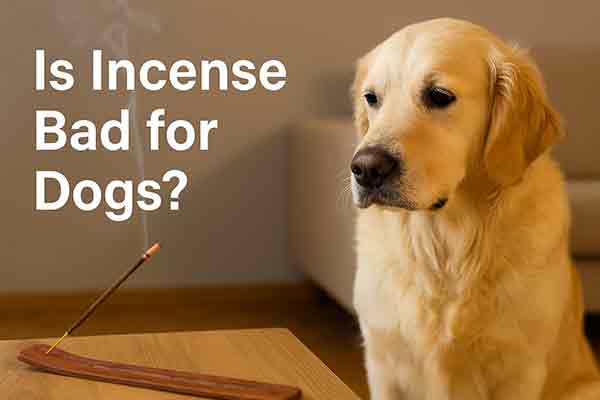Is Incense Bad for Dogs? | Pet Safety and Air Quality Guide
Table of Contents
- Introduction
- What Is Incense?
- Why Dogs Are Sensitive to Incense
- Potential Risks of Incense for Dogs
- Common Symptoms of Irritation in Dogs
- Safe Incense Practices If You Have Dogs
- Dog-Safe Air Freshener Alternatives
- When to Consult a Veterinarian
- Conclusion
Introduction
Burning incense can add a calming aroma to your home, but if you’re a dog owner, you may be asking, “Is incense bad for dogs?” While it’s great to make your living space smell pleasant, not all methods are pet-friendly. Dogs have extremely sensitive respiratory systems, and even mild exposure to smoke or strong fragrances can pose health risks. In this article, we’ll explore the impact of incense on canine health, symptoms to look out for, and safer alternatives for maintaining a fresh-smelling home.
What Is Incense?
Incense is made from aromatic plant materials combined with essential oils, resin, and binders. When lit, incense releases fragrant smoke that many people use for relaxation, meditation, or spiritual purposes. It comes in various forms such as:
- Stick incense
- Cone incense
- Resin incense
- Coil incense
While incense may seem harmless to humans, its smoke contains particles and volatile compounds that can negatively affect dogs.
Why Dogs Are Sensitive to Incense
Dogs rely heavily on their sense of smell, which is 10,000 to 100,000 times more sensitive than ours. Their respiratory systems are also smaller and more reactive to airborne irritants. Because of this, what seems like a subtle scent to us can be overwhelming—or even harmful—to a dog.
Some reasons dogs are more vulnerable include:
- Smaller lung capacity
- Heightened olfactory receptors
- Longer exposure due to staying indoors
- Sensitivity to smoke and chemicals
Potential Risks of Incense for Dogs
Burning incense around dogs may lead to a range of mild to serious health issues depending on frequency, ventilation, and the dog’s overall health. Common risks include:
- Respiratory issues: Inhaling smoke can cause coughing, wheezing, or labored breathing.
- Allergic reactions: Dogs may show signs of skin or nasal irritation.
- Headaches and disorientation: Strong scents can affect your dog’s behavior and mental comfort.
- Long-term lung damage: Frequent exposure could contribute to chronic respiratory problems.
- Carcinogenic particles: Some incense contains ingredients linked to cancer when inhaled regularly.
Common Symptoms of Irritation in Dogs
If your dog is affected by incense, you may notice the following symptoms:
- Excessive sneezing or coughing
- Watery or red eyes
- Runny nose or nasal discharge
- Lethargy or avoiding certain areas
- Scratching at the face or ears
- Wheezing or shortness of breath
These symptoms may appear within minutes or hours of exposure. If they persist, consult your veterinarian immediately.
Safe Incense Practices If You Have Dogs
If you still want to use incense in your home, follow these safety tips:
- Burn incense in well-ventilated areas
- Keep your dog in a different room while incense is burning
- Use incense sparingly and only when necessary
- Opt for natural, chemical-free incense products
- Install air purifiers to reduce airborne particles
Dog-Safe Air Freshener Alternatives
There are plenty of dog-safe ways to keep your home smelling fresh without exposing your pup to harmful smoke or chemicals. Consider these options:
- Essential oil diffusers (using pet-safe oils like lavender or chamomile, in moderation)
- Baking soda air fresheners for odor absorption
- Activated charcoal bags to purify indoor air
- DIY potpourri made from dried herbs and citrus
- Open windows to allow fresh air circulation
Always double-check that any essential oil or air freshener product is non-toxic to dogs before use.
When to Consult a Veterinarian
If your dog shows any of the symptoms listed earlier or seems uncomfortable in areas where incense is used, it’s best to consult a vet. Immediate medical attention is especially important if your dog is:
- Having difficulty breathing
- Vomiting or showing signs of nausea
- Unresponsive or lethargic
- Known to have asthma or respiratory conditions
Conclusion
So, is incense bad for dogs? In most cases, the answer is yes—especially if it’s used frequently or in poorly ventilated areas. While the soothing scent of incense may enhance your environment, it could be a source of discomfort or even danger for your four-legged companion. Fortunately, there are plenty of safer alternatives that allow you to maintain a fresh, pleasant home while keeping your dog safe and healthy.
For more pet wellness tips and home safety guides, explore our blog and subscribe to stay informed on how to create the best environment for your furry friend.







